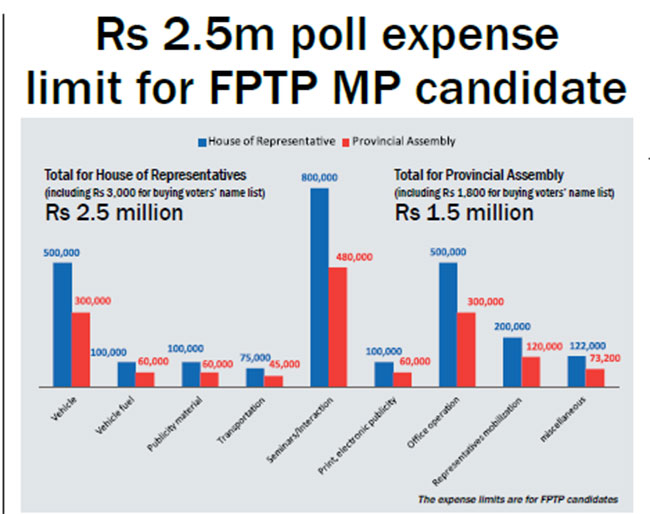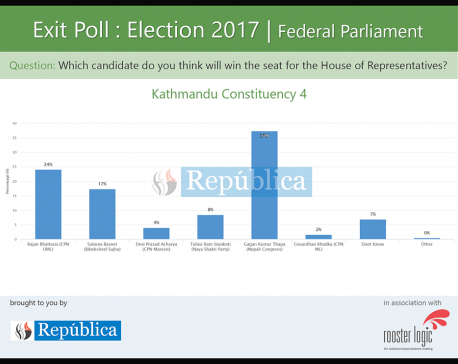
OR
Rs 2.5m poll expense limit for FPTP MP candidate
Published On: October 14, 2017 01:42 AM NPT By: Bhadra Sharma

KATHMANDU, Oct 13: The Election Commission (EC) has fixed Rs 2.5 million as an election expenditure limit per candidate contesting the upcoming parliamentary elections under the first-past-the-post (FPTP) electoral system. A candidate contesting the provincial assembly elections, however, can spend up to Rs 1.5 million.
A board meeting of the election body headed by the Chief Election Commissioner Ayodhee Prasad Yadav decided to increase the election expense limit considering the inflation, market prices, electoral constituencies and number of voters.
In a press statement issued following Friday's meeting, the election body said a candidate contesting the parliamentary elections under the proportional representation system can spend up to Rs 200,000 while a candidate contesting the provincial assembly polls under the PR system will have to limit such expenditure to Rs 150,000.
Previously, the EC had proposed a maximum Rs 1.4 million for a candidate contesting parliamentary elections under the FPTP electoral system and Rs 700,000 for a candidate contesting the provincial election under the same system.
For the Constituent Assembly elections of 2013, the EC had fixed Rs 919,000 as the poll expenditure for a candidate under the FPTP system. The expenditure limit for the 2013 election was almost double compared to the 2008 CA elections. The expenditure limit per candidate during the 2008 election was Rs 459,500.
Politicians who had contested the recent local elections said the expenditure ceiling fixed by the EC on Friday was 'totally impractical'. According to party leaders each mayoral candidate spent at least Rs 10 million in the recent elections.
Politicians say poll expenditures will shoot up in the upcoming parliamentary and provincial assembly elections since the electoral constituencies in these elections are larger compared to the local election constituencies. There are only 165 electoral constituencies for the parliamentary elections under the FPTP electoral system while there are 753 local units.
Ahead of the CA elections in 2013, the EC had requested the political parties to collect election funds through the banking system citing transparency and accountability issues. But most of the parties failed to comply despite their pledges to do so.
Nepal's political parties, which are still beyond the jurisdiction of corruption controlling agencies, are considered as corrupt institutions. A survey conducted by the Berlin-based Transparency International in 2011 had ranked Nepal's political parties as the most corrupt followed by the legislature and the police as the second and third most corrupt institutions in Nepal.
You May Like This

Exit poll shows NC candidate Gagan Thapa ahead in Kathmandu-4
Exit poll shows NC candidate Gagan Thapa ahead in Kathmandu-4 ... Read More...

Candidates likely to exceed poll expense ceiling set by EC
MYAGDI, Oct 27: Leaders of various political parties are found delivering speeches in public gatherings and assuring people during door-to-door visits... Read More...

UML poll candidate injured in clash with NC cadres
KHOTANG, June 10: A CPN-UML candidate for the local level elections was injured in a clash with Nepali Congress cadres... Read More...







Just In
- NRB to provide collateral-free loans to foreign employment seekers
- NEB to publish Grade 12 results next week
- Body handover begins; Relatives remain dissatisfied with insurance, compensation amount
- NC defers its plan to join Koshi govt
- NRB to review microfinance loan interest rate
- 134 dead in floods and landslides since onset of monsoon this year
- Mahakali Irrigation Project sees only 22 percent physical progress in 18 years
- Singapore now holds world's most powerful passport; Nepal stays at 98th











Leave A Comment